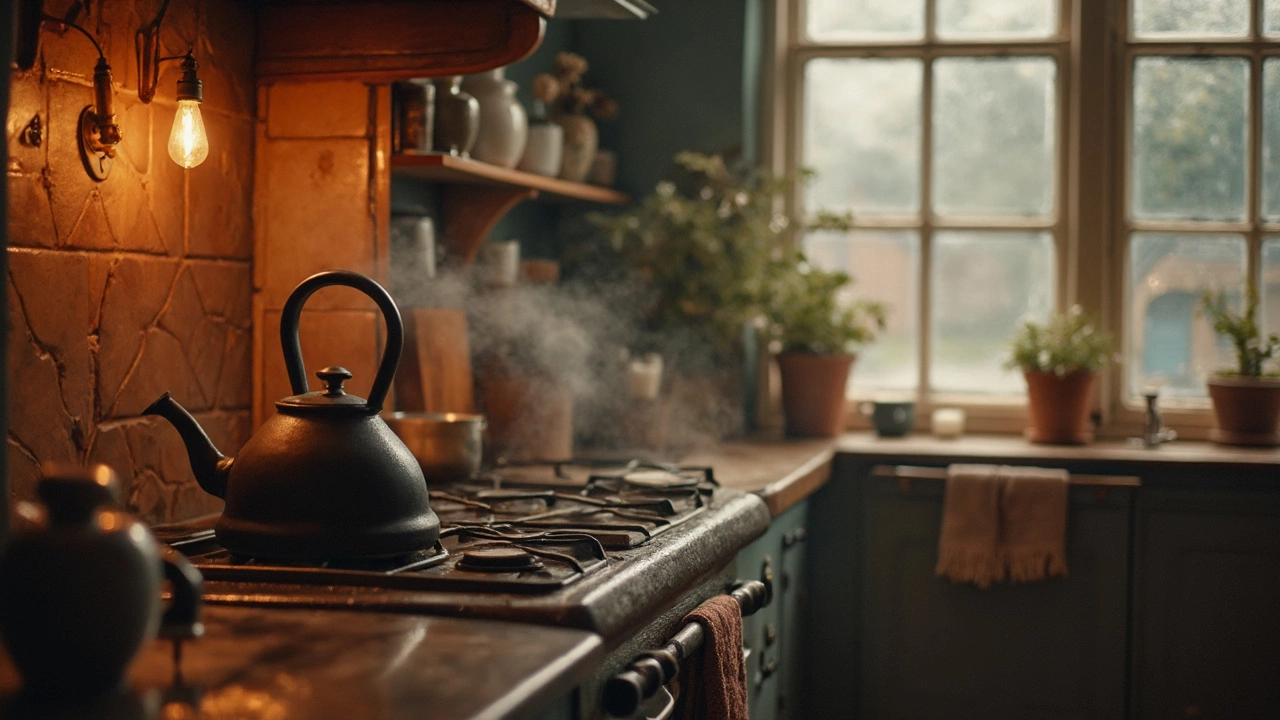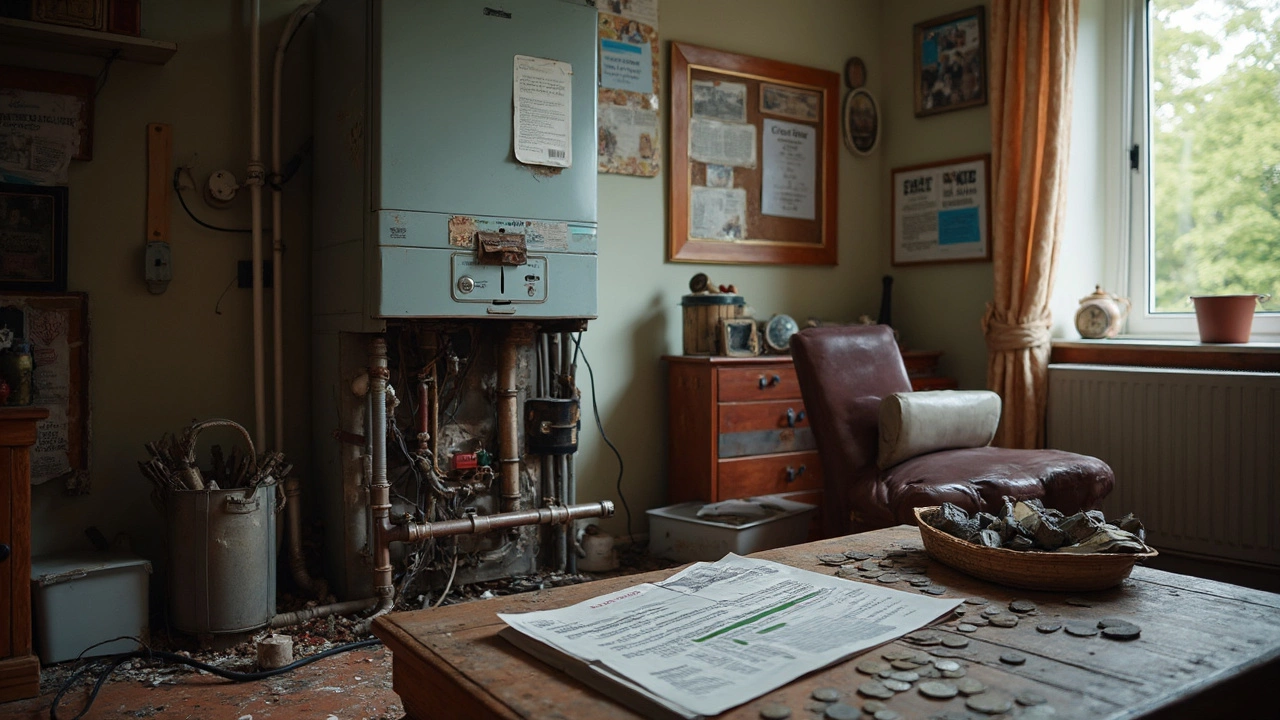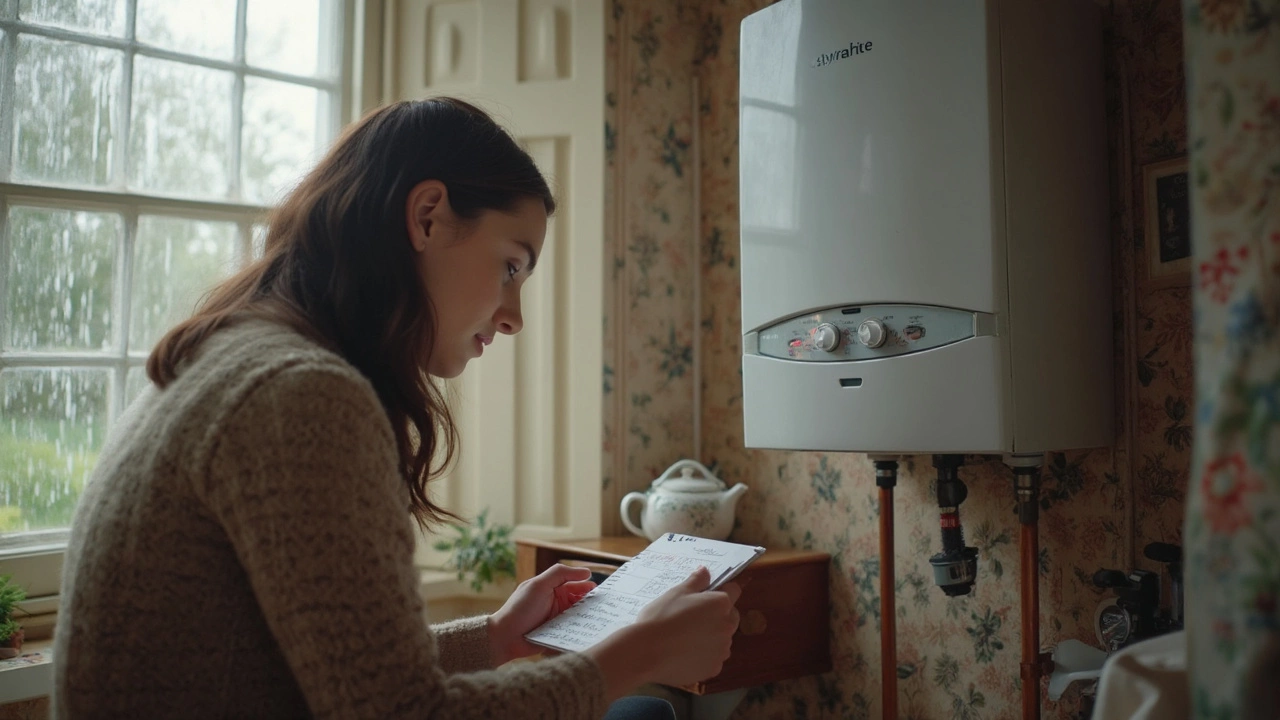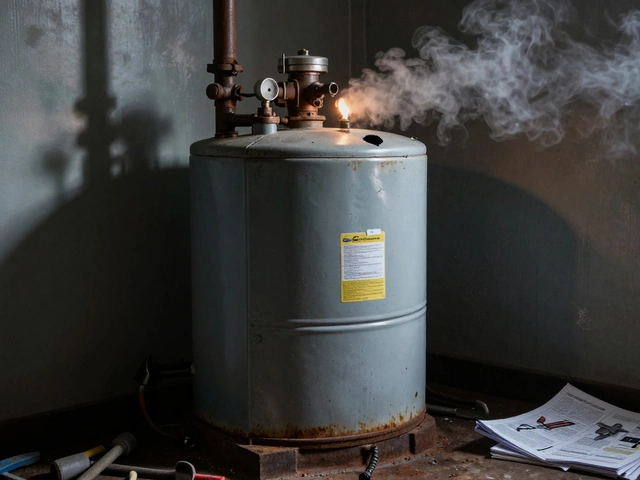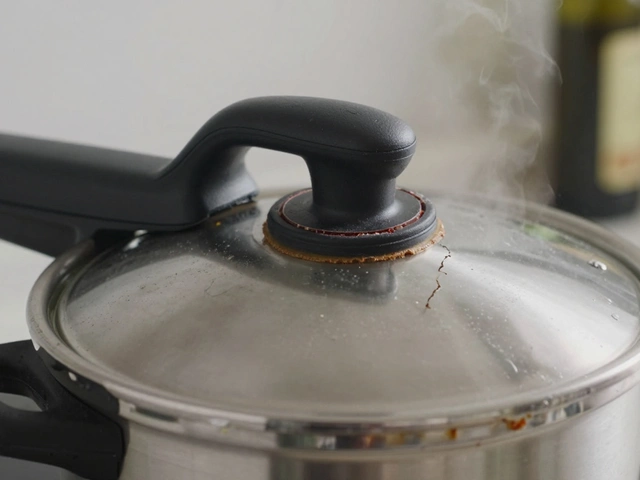So, your boiler's given up just when you needed it the most. Sounds about right, doesn't it? But now, what do you do when a hot shower seems like a distant dream? Well, don’t worry! You're not the only one who’s been left in the lurch by an old boiler.
First thing's first, let’s weigh our options. You've got a few quick fixes and workarounds that might help you stay squeaky clean while the boiler’s off-duty. No need to panic just yet.
- Dealing with a broken boiler
- Temporary shower solutions
- Safety considerations
- Prevention and maintenance tips
Dealing with a Broken Boiler
Ah, the dreaded sound of silence from your boiler when all you want is a nice hot shower. It's more common than you think, and there are a few things you can do right off the bat.
Determine the Cause
First up, identify if it's a simple glitch or a major problem. Is there an error code showing on the boiler? These codes can be your ticket to understanding what's gone awry. Look up the manual or the manufacturer’s website to decode the message.
Check the Power Supply
It might sound basic, but make sure there’s power. Sometimes, a tripped circuit breaker or a power outage is the culprit. Flip the breaker off and on to reset it—it might just fix it.
Inspect the Thermostat
Your boiler has a buddy called a thermostat, and if they’re not talking, you’ve got a problem. Ensure the thermostat is set to the right temperature and the mode is correct. If it’s a battery-operated thermostat, pop in some fresh batteries.
Pressure Problems
Low water pressure can affect how your boiler operates. Check the pressure gauge; it should generally be between 1 and 2 bars when cold. If not, you might need to repressurize by adding water to the system.
Call in Professional Help
If none of these steps solve the issue, it’s time to call in an expert. Having a professional take a look is always a safe bet, ensuring you don’t end up causing more damage.
For some peace of mind, here’s a quick checklist:
- Verify power supply
- Check error codes
- Test the thermostat
- Monitor water pressure
Dealing with a broken boiler is no one's favorite pastime, but with these steps, you'll know where to start before making that sometimes costly call to a technician.
Temporary Shower Solutions
When your boiler decides it's time for a vacation, showering becomes a bit of a challenge. But hey, it’s not the end of the world! Here's how you can manage to squeeze in that much-needed shower without a functioning boiler.
Try the Good Old Kettle and Pot Method
This might take you back a few decades, but trust me, it works like a charm. Boil a pot or two of water on your stove or use an electric kettle. Once it's ready, mix the hot water into your bathtub or a large bucket with some cold water to get just the right temperature.
- Boil a pot of water using your stove or kettle.
- While it's heating, fill your bathtub with some cold water.
- Carefully pour the hot water into the cold, adjusting to your preferred temp.
- Use a cup or jug to pour the water over yourself for a DIY shower effect.
A bit primitive but effective, right?
Portable Shower Heads
If you're into gadgets, you might want to get a portable shower head. These battery-powered options can be a lifesaver. Simply plug the shower head into a bucket of warm water and voilà, you have your own makeshift shower.
Hit the Gym or Community Centers
Fitness centers and local community spaces often have showers available. Not only can you get your workout done, but you can sneak in a hot shower too. Just remember to check their hours and bring your own toiletries.
Check Out Cold Showers
Now, this one isn't for the faint-hearted, but a cold shower has its benefits. It's known to improve circulation and boost your mood. Start with lukewarm water and slowly work your way down if you dare. Who knows, you might even grow to like it!
Tackling a shower with a broken boiler might seem daunting, but with these tips, you'll get by just fine until things are back to normal. Keep calm and shower on!
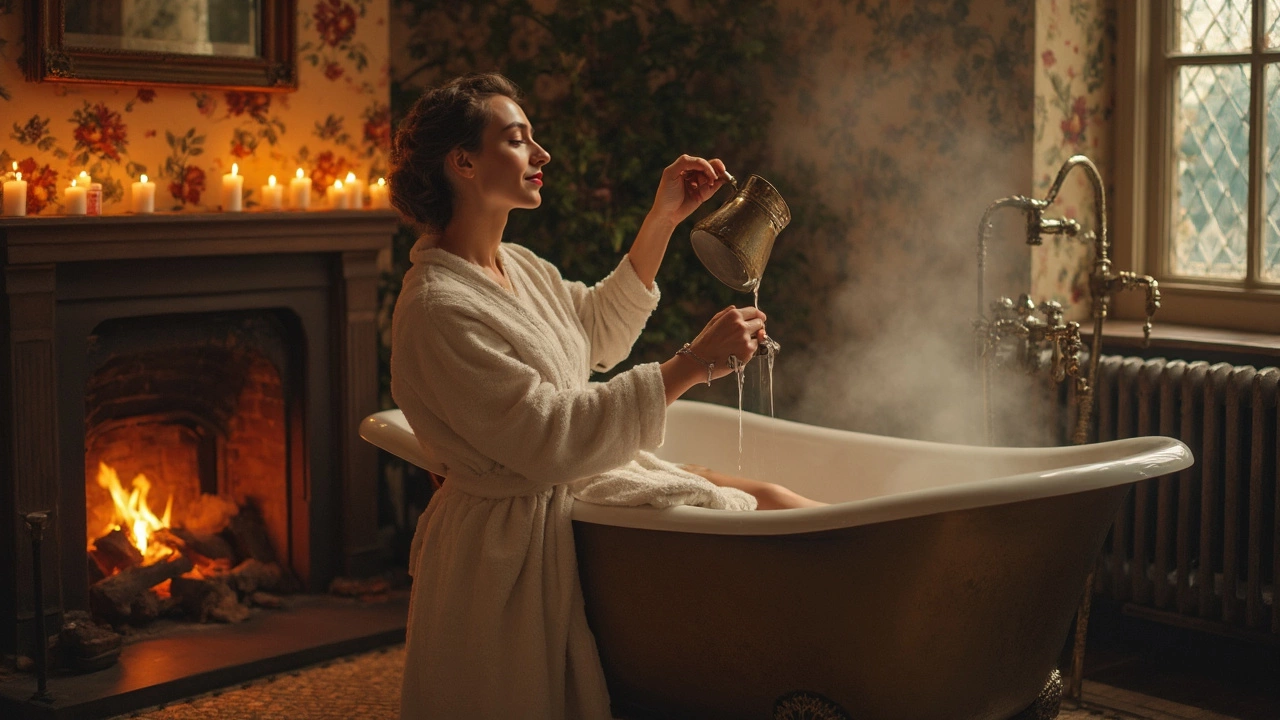
Safety Considerations
When dealing with a broken boiler, safety should be your top priority. Even though it's inconvenient, cutting corners can lead to bigger problems. Here’s what you need to keep an eye on:
Check for Gas Leaks
Gas boilers can sometimes leak which is super dangerous. If you smell gas, don't try to fix it yourself. Open the windows, step outside, and call a professional right away. Better safe than sorry!
Electrical Hazards
If your boiler issue involves faulty wiring, you might be dealing with an electrical hazard. Water and electricity don't mix, no exceptions! Turn off the power and leave it to the experts.
Prevent Scalding
When you try alternative heating methods, like boiling water on a stove, you risk scalding yourself. Always mix hot with cold water to bring it to a safe temperature. Test it on your wrist first—like you would for a baby bottle.
Carbon Monoxide Concerns
Boilers can be a source of carbon monoxide if they're not venting properly. Invest in a carbon monoxide detector if you haven't already. This little device can be a literal lifesaver.
Monitoring Water Temperature
Keep an eye on your water heater setting to ensure it’s not too hot. The recommended setting is generally around 120°F (49°C) to prevent burns.
Safety Measures Table
| Risk | Precaution |
|---|---|
| Gas Leak | Call a professional |
| Electrical Fault | Turn off power, call an expert |
| Scalding | Mix hot and cold water |
| Carbon Monoxide | Install detectors |
Remember, tackling stuff on your own is fine when things are small, but big issues, especially involving gas or electricity, are best left to the pros. Knowing these safety considerations can't just save you a headache—it might even save your life.
Prevention and Maintenance Tips
Keeping your boiler in top-notch condition doesn't have to be rocket science. A little TLC can keep the breakdowns at bay and ensure you’re not left with freezing showers. Let’s dive into a few simple steps you can take to avoid a boiler crisis.
Regular Checks
A regular once-over can make a huge difference. Check for any signs of leaks or weird noises. Yep, that whistling sound isn't just annoying—it’s a cry for help. Schedule a quick boiler inspection every year, preferably before winter kicks in.
Bleeding Your Radiators
Trapped air in your radiators can put extra strain on the boiler. Give your radiators a good bleed every now and then to make your heating system more efficient.
Pressure Check
Low water pressure can lead to boiler issues. Keep an eye on the pressure gauge. If the needle's dipping below the recommended level (usually between 1 and 2 bars), it might be time to top up.
Keep It Clean
Dust and debris aren’t your friends when it comes to the boiler’s exterior. Make it a habit to wipe it down and keep the surrounding area clutter-free.
Professional Servicing
We all love a good DIY project, but when it comes to servicing, call in the experts. A professional can spot issues that might not be obvious to the untrained eye.
Monitor Efficiency
How old is your boiler? If it's been around for over a decade, its efficiency might be less than ideal. Consider upgrading to a newer model. Not only will you save on bills, but you’ll also lower the breakdown risk.
Thermostat Settings
Keep your thermostat at a steady temperature. Constantly changing it puts unnecessary pressure on the boiler. Find a comfort zone and stick to it.
Insulate Pipes
Frozen pipes can cause major headaches come winter. Use foam pipe insulation to protect them from freezing and, in turn, protect your boiler from overworking.
Following these straightforward tips won't just keep your showers warm—it’ll also make your home more energy efficient. And in the long run, a little prevention can save you from a pricey emergency call-out.
